#john winchester haunting the narrative
Text
it's wild to me that dean is always so shocked at children of monsters, especially relatively well-adjusted adjusted ones à la garth and the werewolf family in 9x12... like the concept of a second generation werewolf baffled him. but is he not a direct mirror of that?? are he and sam not the second generation of a way of life that ostracizes one from society and often results in premature death (dare i say... see: 15x20)? like hunters and monsters are at odds, sure, but in a way that just makes them interesting foils to each other, meaning that he's a mirror to the very thing he can hardly believe exists. very... dean.
#idk. just a strange look into how he thinks of himself and the things he hunts maybe#having thoughts about the winchester bros' childhood(s). yeah.#it feels like a look into the fact that he really did internalize the things john taught him. good writing. my favorite ghost in the show i#john winchester haunting the narrative#like it feels like a continuation of the whole 'i could never have anything in common with a monster' thing that he had going on during#sam's demon blood addiction arc#mmmm. dean you have changed so much but you never change. god#spn#the brothers winchester#dean#theo.txt#and im sure im not the first one to have thought of this but god these characters make me insane
2 notes
·
View notes
Text
It's wild to me that people's opinions of John (not factoring in personal bleed) are based ENTIRELY on the shitshow that was his life post-Mary death. Like people are out here measuring Sam's and Dean's heights to calculate the nutritional deficit in Dean's physical development but can't spare a minute to think about John as a whole character. Okay come with me for a minute:
you're John Eric Winchester from Normal, Illinois, and you're a pretty ordinary child, there's literally nothing exciting about you but here you are! You exist! You like yo-yos and guns and planes or at least that's what your parents buy for you.
your dad, who tends to go to work at odd hours, takes you to see an Abbott & Costello movie about a mummy when you're a pre-schooler and it scares the piss out of you. Your dad (who has intimate knowledge of the REAL things that go bump in the night) buys you a music box to calm you down. This music box plays a song from one of the most famous cinematic scenes of romantic melancholy that exists. Despite the late 50s being music box heyday with many options available that play lullabies, for some reason everyone thinks this is a reasonable choice. You will in fact idly whistle "As Time Goes By" all throughout your life.
when you're four, your dad abandons you and you never hear from him again or ever find out why he left you.
your mother Millie doesn't remarry. You have no family around (presumably?) so she raises you, alone, a single mother who can't even claim her husband died in the war, any war. You barely talk about your childhood even in relation to your own sons and how you raise them.
you play baseball/softball because where else can you find a readymade source of companionship and a built-in father figure (from a distance).
at seventeen full of anger and a dad-hole a mile wide you fake your age to join the Marines and be shipped off to Vietnam. While you don't talk about it much when you return to the World, you will default to drill sergeant when your back's to the wall.
you become a mechanic because you come from a family of mechanics.
you meet Mary Campbell and your whole future falls into place. Or at least, that's what you believe. Until November 2nd, 1983.
like there's ALL OF THAT before the John Winchester who's an enormous mess but does everything he can to keep his kids alive. I'm not saying anybody needs to like John but the kneejerk response of "he should be KILLED ACTUALLY" to even the canonically unequivocally good things he did while examining other characters' microexpressions down to the nth degree to ascribe victimhood is just so weird.
#john winchester#look i'll never say he was without flaws#he had MANY and he made no attempt to work on them#but as a character and esp the one who haunts the whole narrative#he's fascinating#TO ME! there's my disclaimer. to MEEEE
128 notes
·
View notes
Text
the Gabriel/Loki episode of the winchesters was good though. That one can stay.
#I mean. I’d remove John & Samuel from the equation.#John because. this ain’t about him.#Samuel because I think he should have stayed gone the whole first season. I like it when absent fathers haunt the narrative#(although to be fair to him he’s not absent by choice. loser got himself kidnapped.)#but yeah anyway. same episode. except it’s just Mary Carlos and Latika taking him on#and also it *is* Gabriel. unequivocally.#Gabriel & Carlos parallels my beloved#something about Carlos leaving the band. leaving them behind. to go be a hunter#that should have been what stung Gabriel the wrong way#and making Carlos choose between his friends. forcing him to choose. rather than allowing him to run again.#sure Gabriel’s whole schtick is punishing other people but if mystery spot taught us anything#it’s that he’ll also punish himself THROUGH another person’s suffering. and Carlos is. a little too similar. so into the torment pile he go#no Gabriel iPad though. stake through the heart. wielded by Latika btw#who in my head is the Raphael parallel of the gang. not that it matters that much. but it does. to me.#(Raphael parallel because. everyone forgot she was also there. and just as capable of stabbing as the rest of them.)#sorry I’m rambling about some hypothetical good version of the winchesters I haven’t had enough sleep
7 notes
·
View notes
Text
the way the absence of john winchester haunt sam and dean in ways that are more real than any ghost they have ever faced. the way john echoes so loudly in the narrative even in episodes he’s not mentioned, in seasons where he never appears. the way john possesses dean when he’s angry and sam when he’s grieving. the way john is the one true god of the narrative, the absent father who does not answer prayers or phone calls. the righteous man who does not break in hell but breaks down and hands his child a gun. john and the memory of his holy mary. john the prophet and his sacred text. john and his prodigal son that he knows has to die.
#john winchester#john as a character and narrative tool is so fascinating to me#the way the show utilizes both his presence and absence#the intergenerational trauma and cycle of abuse stuff is what elevates the show#even when the writers are fumbling the motw stuff or the season arcs#the impact of john is still so apparent and raw and visible#a lot of that is on the actors vs the writers tho#john winchester hate club#supernatural#sam winchester#dean winchester#SPN
1K notes
·
View notes
Text
254 notes
·
View notes
Text
This is literally for one person so. Strap in?
While watching the season premier of The Winchesters I was struck by a reoccurring thought:
God this is going to hurt when it ends
I mean how can it not? John and Mary are so young and the spark is there. Mary is full of such anger and hurt, longing for more than the hunter life. And John is a haunted man, desperately trying to find a greater good to fight for after being devastated by war. You can see the threads of who they are here and how their talents and flaws will snowball into the tragedy that their lives become. And that's not even mentioning Carlos and Latika; two vibrant characters who are conspicuously absent from the family history Sam and Dean know.
Some might ask, what's the point in telling a story if you know how it ends? Why rehash the history for a man who ultimately abused his kids and went against the wishes of the woman he loved. Why torment us with the tragedy of a woman who never was able to escape the generational trauma she was stuck in, and who was unable to prevent her children from suffering the same fate?
Because to know how it ends, and still sing it again. As if it might turn out this time. I learned that from a friend of mine.
Hadestown is hands down one of my favourite musicals ever written. It bends genre and breaks the fourth wall to provide a story rich in meaning and heart. When Hermes sings "It's a sad song, it's a sad tale, it's a tragedy" in the opening number, we know from the beginning exactly what story is being told. It is an old song, a sad song, a love song.
Over the course of the musical you watch as Orpheus and Eurydice make choices that pull them apart; Eurydice's need for more for security driving her into the arms of Hades and Orpheus' inability to see the world as it is revenge him from seeing the real problems they faced. And when it comes down to it, after all the struggling and triumph, after helping the gods dance again, doubt still creeps. And Orpheus looks.
And yet, in the final numbers, we see the stage reset, the story preparing to tell itself again. A literal representation in telling a story for the story's sake mirrored in the play being performed night after night. As if it might turn out this time. And so it goes, again and again being told as a reminder and a warning and for the sake of the story itself.
Thankfully, in our case Dean is no Orpheus, always doomed to turn and look. Here he is Hermes, the story teller, the one guiding us through a story we think we know. The Winchesters, much like the tale of Orpheus and Eurydice, has merit even if it may not appear relevant on the surface. While I doubt any of us will be forced to sing before the Lord of the Underworld, we will have to find the strength to push through an impossible situation. And while we may not be fighting demons and ghosts in our day to day lives, many of us have complicated relationships with family and must learn how to see them as more than just the harm they caused us, perhaps not forgiving but understanding for our own healing and growth. The Winchesters provides a unique opportunity for a character to take back the narrative and tell their story how THEY want, their voice guiding us forward.
There are other far better written meta on what exactly may be happening in The Winchesters, where exactly this story is going. For my part, all I can say is I look forward to seeing what story Dean would like to tell us, what old song he wants to sing for us again and again and again.
#supernatural#the winchesters#hadestown#holy fuck it's been a while#shity meta from a silly little theatre kid#did I cry thinking about the parallels between Mary as Eurydice and John as Orpheus#perhaps
98 notes
·
View notes
Text
Okay. So. I never talked much about parallels in 2.11 Playthings, but I'm swinging back to some discussion on them because the potential parallels are very interesting, but tricky in some ways. I think there's definitely some comparisons being made between Sam and Dean, and "sisters" Tyler, Maggie, and Rose.
If you don't recall much of the plot of this episode, here's a rundown:
The episode takes place in a historical home turned hotel that the family can no longer afford to keep running. The property is going to be sold and then demolished (something the owner, Susan, doesn't actually understand until the sale is finalized). For now though, Susan and her daughter Tyler live in the hotel with Susan's mother (Tyler's grandmother) Rose. Young Tyler has an imaginary friend named Maggie, who is actually the ghost of her great aunt—Rose's older sister, who drowned in the pool when she was a child. For years, Rose used hoodoo (they probably meant voodoo given the context but I digress) to keep her older sister's ghost away from the house. However, Rose suffers a stroke, becomes sequestered in her room in the attic, and looses her speech, preventing her from suppressing Maggie's spirit any longer. Maggie is then able to manifest in the home and begins killing guests while simultaneously forming a sister-like bond with Tyler. Maggie eventually finds out that the house is going to be sold and Tyler is going to leave, and she knows she'll trapped in the house alone... then she'll be demolished with it. Not wanting to be alone, she convinces Tyler to jump from the second floor into the pool so they can be together forever, and then holds Tyler's head under the water to drown her. Sam is able to break into the pool room and save Tyler, while Rose calls Maggie's spirit away, promising to die and stay with Maggie forever if she lets Tyler and Susan go.
If one was so inclined, they could draw some extremely ugly narratives about Sam, Dean, or both from all of this. I actually think there are multiple parallels that work in different ways, but the one that jumps out the most is this:
Maggie is Dean and Sam is Rose... and Tyler is also Dean
Maggie is the older sister while Dean is the older brother.
Rose is the younger sister with "powers", and Sam is the younger brother with powers.
Maggie dies in childhood and Dean has his childhood ripped away by parentification. A certain degree of alienation with the younger sibling occurs as a result.
The younger sibling's powers have the capacity to separate each group of siblings. Rose deliberately uses her powers to keep Maggie away, while an order to kill Sam because of his powers has the capacity to take Sam from Dean (which is a discussion between Sam and Dean within the episode).
Maggie believes Rose doesn't love her because she "kept me away for so long" which feels reminiscent of Dean's belief that Sam doesn't really care that much about him because he cut contact at Stanford.
Maggie is doomed to haunt her empty family home, and once everyone else leaves, the whole structure will be demolished. In season 2, Dean is doomed to be the last surviving member of the Winchester household, and the whole structure will collapse in on Dean when Sam dies because Dean is tethered there—he can't leave—in some sense, he has become their family house itself.
I think there's also something to be said here about Maggie's mixed up roles in her household versus Dean's mixed up roles in his, and how each of them is morphed into these different shapes and is both young and old simultaneously. Dean is Sam's brother, but through parentification, Dean is Sam's parent and John's spouse. Maggie's family roles are also mixed up—but through her death. Maggie relates to Tyler as a fellow child and a replacement sister, but is really Tyler's great aunt. Maggie is worn down and embittered like only an adult can become after years of pain, but her appearance and frame of mind is largely childlike. Dean, in turn is split—a part of him young and desperate to live, and a part of him old and worn down and tired and ready to go.
This is partly why Tyler is also a Dean mirror: Part of Dean is old and tired and full of despair, but another part of Dean is young and full of youthful potential—a whole life ahead of him. The worn down, exhausted part of Dean is going to win in 2.22, is going to take the part of Dean that knows he deserves to live (who we see, for example, in 3.10 "Dream A Little Dream Of Me") put his head under the water, and start drowning him.
This is also why, within the episode, Sam and Rose jointly save Tyler from Maggie. It represents Sam's capacity to save Dean from dooming himself to hell—foreshadowing for the original ending for season 3, which was shortened due to the 2008 writer's strike—but originally would have ended with Sam saving Dean from his demon deal. Sam could lift Dean's drowning youth from the water, and simultaneously put the part of Dean that's old and tired and has despaired to rest.
13 notes
·
View notes
Text
supernatural is a show ruled by absent fathers. john winchester and god occupy the same place in the narrative: responsible for everything and almost entirely absent, dead or missing. there’s something so haunting about spn’s depiction of the biblical, at least so far (up until the end of s4). a bunch of beings with more power than they know what to do with letting the worst come. god has left the building if he was ever there. john winchester’s dead and he’s still being talked about constantly, his sons are still reflecting his patterns, pulling lines from his speeches. their dad is god. god is their dad.
#spn first show to ever have the concept of god haunting the narrative….#oliver talks#spn#supernatural#just finished s4
3 notes
·
View notes
Note
🙊 - John Winchester
OOO okay. strap in
so in the beginning of my spn fandom days (like 10 years ago omg has it been that long) I HATEDDDD john. wanted to beat him with hammers. and then I realized that I very much projected my own issues with my own father onto him bc he reminded me so much of him and then I was like huh he's fictional. I can have fun with this bc it's fictional and it's a fandom! (also I dealt with a lot of issues with my dad so that isn't as painful anymore)
so today I like and enjoy john I think he's an interesting complex character that VERY much haunts the narrative. AND there's the whole "your father who is god" thing, which is just 😵💫😵💫😵💫😵💫😵💫 bonkers to me. like your father is an absent god, god is an absent father, etc etc. very very compelling to me personally
I do somewhat ship deanjohn and samjohn in a way that's like. horrific and obsessional and dysfunctional (but still very much full of love)
also I do think within canon there's both text and subtext that alludes to him being abusive. but it's so interesting to me that sam and dean are still soooo full of love and devotion (as well as hatred and other stuff) bc family relationships are complex! and especially in the way the boys grew up!
I'm under the impression that a lot of people (not everyone but a good amount) view john as like this irredeemable monster and/or this emotionless figure and I just. don't think that's true.
ALSO. very important. jdm is soooo hot 🥵
ask game
#basically tdlr im not an anti im not really an apologist. i AM an enjoyer. an observer if you will.#thanks for the ask!!#nep's asks#nep speaks#john winchester#spn#*tldr
2 notes
·
View notes
Text
Some thoughts on The Winchesters after episode 5, and on self-reflection, and what it may tell us about Dean’s situation:
This was originally written as a thread on Twitter, which is (unfortunately) where I have historically done most of my meta writing. (Here is a collection of my Twitter posts about this show, including a few long meta threads.) I’m trying to get better about crossposting to tumblr ASAP when it's manageable.
All this to say that if this reads like it’s written in bite-sized chunks… that’s why. Also, I am writing this at midnight from an iPad lol.
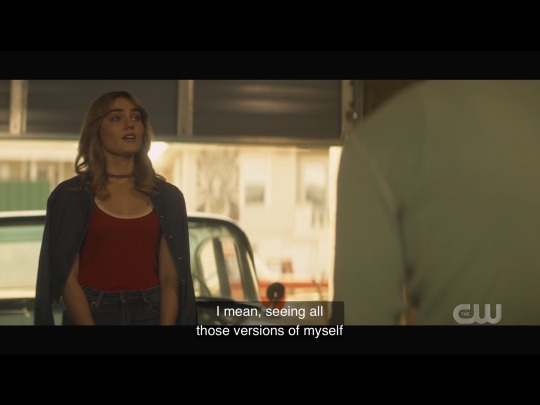
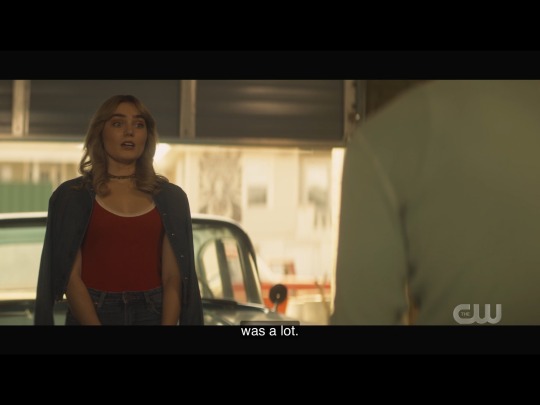
So… This “Dean all the way down” show, if you will. In every episode of this show, its main characters highlight important things about Dean’s life and his relationships with others, as well as the unfinished parts of his story. Here’s a handy refresher, courtesy of my friend Matt.
I am compelled by the consistency of this (to the point of hypothesizing that Lata will be the main Dean mirror of the week in ep6).
I am also compelled by what is shaping up to be one of many consistencies in not only the themes but also the PLOTS of these episodes:
In every episode so far other than the pilot (I think?), someone is taken and trapped physically and/or mentally. Their freedom requires examining who they are as a person and what’s important to them, and/or examining who they are in relation to who they care about, mostly via reflective versions.
2: John, taken by La Tunda who punishes disobedient children & masquerades as Millie
3: Mary, taken by Bori Baba who lures you in with what you want most
4: John & Carlos, taken by a god of “destiny” who wants John to be like him
5: Mary, trapped in her mind by the Akrida
They’re all different situations, but at their core the key to freedom in the plot is always some form of self-reflection.
It’s making me wonder, because… well, we’re explicitly dealing with a narrative that’s cyclical, yes? We know that already, and the show’s not shy about it…
Cycles of violence + parents & children, on a micro level (Winchester family) and macro level (forces wanting to mold you into something you don’t want to be, or control you; Chuck/God as Father, destiny, and now Akrida).
But is it also a cycle in regards to this self-reflection?
Metaphorically, yes. This is what Dean is doing here and it’s why the characters are continuously acting as rotating mirrors for him. But what I’m beginning to wonder is if we’re meant to start taking it as hints to being literal for Dean, the way it is for the characters.
The characters repeatedly participate in self-reflection to free themselves from literal traps, and that self-reflections acts as reflection of Dean. What does this maybe tell us about what’s LITERALLY happening to Dean? Can we start piecing together that he’s trapped somewhere and uncovering/telling this story is key to his freedom?
🎶 Like a circle in a spiral
Like a wheel within a wheel
Never ending or beginning
On an ever spinning reel 🎶

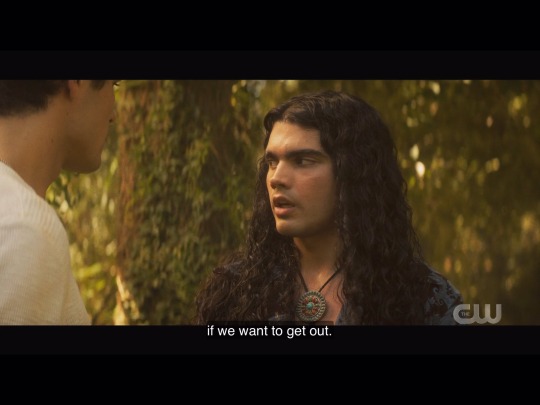

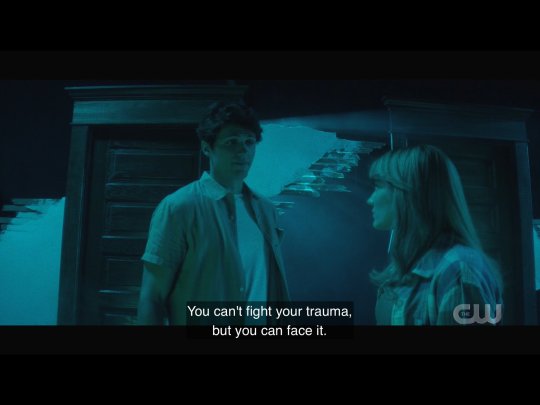
They keep being trapped in places where they have to face aspects of who they are, who they love, and what haunts them. Maybe that’s the literal situation Dean could be in (fake Heaven trap?) and is part of the reason for the story he’s telling. Examining himself to break free.
I don’t know how front-facing in terms of the plot this may be. It could remain metaphorical. or be an extra-narrative reference about the prequel being its own thing but also a quasi stepping stone to a sequel.
But Dean being Trapped is, at this point, feeling pretty implicit.
Combine this with how mirror and reflective imagery is starting to visually pop up a little bit more.
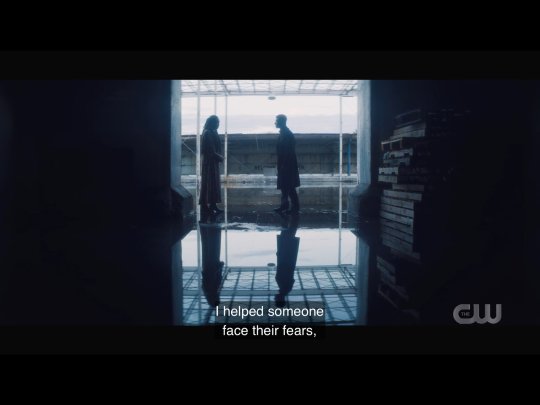
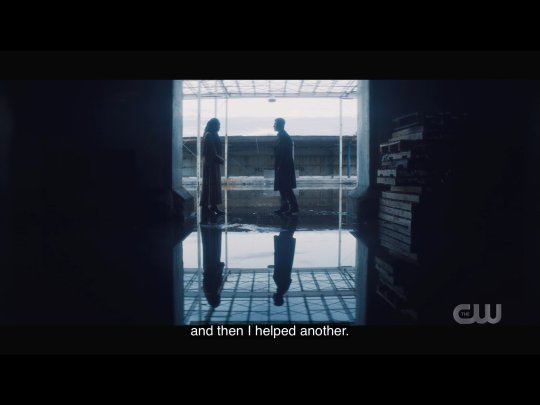
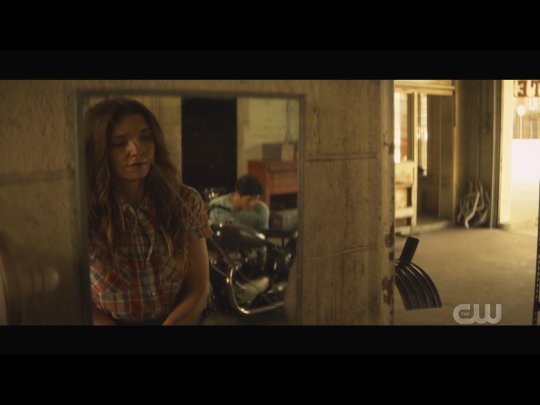
And also combine it with all of the ways Tony’s story parallels Jack’s, and what that could imply about a “Chuck won” through-line… but I’m not getting into that tonight lol.
I am very intrigued. Everything about this is circular, and talking about one aspect kind of tips you into talking about another, which is FASCINATING story construction. So I’m sorry if I repeated myself here!
It’s reminiscent of a triskelion, naturally, a la the necklace in ep2.
Calling it quits for tonight because I am TIRED. Bottom line:
The repeated implication is that Dean is Trapped and doing self-reflection to try to break free. How literal that may or may not in terms of where/when he is remains to be seen, but… it’s feeling more and more pointed.
And I know I’m one of the foremost Chuck won preachers, okay, but I do try not to let it color my view of this show too strongly. I can’t help it that the material feeds me at every turn ¯\_(ツ)_/¯
#spnwin#spnwin meta#the winchesters meta#the winchesters#spnwin 1x05#the winchesters 1x05#when will I post my very long 1x04 meta on this website...#char writes things#dean winchester#unreliable narrator my beloved#hallofmirrorsnatural
33 notes
·
View notes
Text
i forget that john winchester dies in literally the first episode of season 2? and before that they only hang out with him for like two and half episodes? and then we don’t see him again as a person for literal seasons? like that guy mf knows how to haunt a narrative.
6 notes
·
View notes
Text
it's wild to me that dean is always so shocked at children of monsters, especially relatively well-adjusted adjusted ones à la garth and the werewolf family in 9x12... like the concept of a second generation werewolf baffled him. but is he not a direct mirror of that?? are he and sam not the second generation of a way of life that ostracizes one from society and often results in premature death (dare i say... see: 15x20)? like hunters and monsters are at odds, sure, but in a way that just makes them interesting foils to each other, meaning that he's a mirror to the very thing he can hardly believe exists. very... dean.
#idk. just a strange look into how he thinks of himself and the things he hunts maybe#having thoughts about the winchester bros' childhood(s). yeah.#it feels like a look into the fact that he really did internalize the things john taught him. good writing. my favorite ghost in the show i#john winchester haunting the narrative#like it feels like a continuation of the whole 'i could never have anything in common with a monster' thing that he had going on during#sam's demon blood addiction arc#mmmm. dean you have changed so much but you never change. god#spn#the brothers winchester#dean#theo.txt#and im sure im not the first one to have thought of this but god these characters make me insane
2 notes
·
View notes
Text
Oh my goodness I loved this. 1x01 of The Winchesters, let's goooooo.
This was a strong pilot episode, the whole cast is excellent with each bringing their own energy and doing well with the hints of depths to come on all of them. The John-Mary-Carlos-Latika interplay really snaps, and there's the different relationships inside the group, surrounding John and Mary's early connection and pining. But all these friendships and relationships are going to be really fun to watch unfold. Millie and Ada are luminous, both serving in the gravitas roles to flank the main four and add some ballast.
Really enjoying the entire gestalt of this, the look, tone, and visual style. Those NOLA locations are gorgeous and the perfect backdrop--they filmed at an old fort for this one.
The arcane lore and books and hidden chambers, the monsters, the family multigenerational traumas and secrets, it even goes a bit Indiana Jones mood a few times which is a delightful flourish.
The core driving theme of it being about connections and family and friendships and all kinds of love, the hurt in their back stories. John coming back from 'Nam already having nightmares on the bus to Lawrence. John having a sweetness and innocence to him but the darkness is already starting to show. We are going to see him utterly "ruined." Millie trying so hard to save and protect her son, to protect what is left of her fractured family, but also knowing she has to let him find his own path. Mary's closeness to her family, the trust she has with her father, but also aching to escape that life. Her bossiness and her hard facade while she keeps showing what a soft heart she has. Her grief for her cousin Maggie who was like a sister to her. (Maggie flashbacks when????) John and Mary both looking for missing fathers. Carlos losing his whole family to a monster and knowing how grim things are for hunters yet has his unquenchable spirit and he's every bit a tough, skilled hunter, but also plays guitar and relishes humor. Latika just starting to get out there in the field as a hunter, with her main strength right now her intellect but we know she's going to do more than just that. I'm so curious to see her have to kill something and get blood-splattered and see her shock at what she just did and at the same time want to protect her from all harm. Latika seems like a gentle heart who is going to be capable of ruthlessness when it's needed. Ada in just a few introductory moments already clearly a caring, strong willed person who refuses to quit fighting, and is already in the thick of it with the hunter team.
There's a lot here already with loss and trying to save the ones you've got. Carlos killed the ghoul that killed his family but couldn't save them. Millie having Henry slip away from her, and not able to save her son, but trying to. Mary unable to save her cousin Maggie, and now trying to find and save her father. John unable to save Murph and now haunted by his memory. Latika unlocking the dark forces of the monster trap box to save everybody from the loup-garou.
And there's our Dean. Standing by the side of the road, writing in his journal, telling the story and putting together the pieces of the past, to help make sense of who he is and where he came from, and he's picking his own music. Reclaiming the narrative like the badass he always is.
#The Winchesters#spnwin#John Winchester#Mary Campbell#Carlos Cervantez#Ada Monroe#Millie Winchester#Dean Winchester#spnwin meta#spnwin pilot#Latika Dar
35 notes
·
View notes
Note
i fully believe sexism was part of it. sarah was viewed as a weird insane lady even during her life, and i’ve always wondered how she felt about it and if she maybe played into a little? a woman with that much money and freedom was not the norm in her time period, but being seen as a grieving widow with a few screws loose was likely easier than being viewed as a woman who wanted to be taken seriously. but so much of the house is genuinely genius, and there’s a logic to a lot of the weirdest parts.
for instance, i always noticed how every room has multiple ways out, and there’s different routes to get anywhere in the house. part of our training involved being prepared for an emergency, and my favourite part of that test was when my manager took me to different parts of the house and would be like, okay, you’re in the north conservatory, and the staircase directly outside is on fire. what do you do? there’s always a way out, and a backup, and a second backup, and in the worst case scenario you can jump out a window or a door or off a ledge. (i was actually told that climbing down the roof from the fourth floor is a genuine strategy in a worst case scenario.) the house is weird but it’s functional in ways people don’t appreciate, like the corner pieces in the stairs that make them easier to sweep even now, or windows that swing open so you can wash them, or the absolutely ingenious laundry room that had built in scrub boards.
and as for the ghosts—sarah was really only tangentially related to the rifle company. her husband was president for all of four months before he died. there’s absolutely no basis for sarah being haunted by spirits killed by the rifle. but she was by all accounts a wonderful employer who had employees that worked for her for decades. they were well paid, fed, housed, and she even paid for their children’s schooling. the energy in the house never felt malicious to me—even 100 years after sarah’s death it feels like a home. i’m thoroughly convinced the spirits are her former employees, still caring for the house after all these years, and i know when i die i fully intend to haunt winchester. it’s a beautiful, loving crafted home and it always makes me happy to see other people recognize it as more than just “weird scary house”.
it is funny though because people always ask me for ghost stories and all the ones i have are “i heard ghost dogs barking” and “ghosts said merry christmas to me”.
(also if there’s anything you’re curious about, i might have answers!)
Sarah was a genius! I mostly know about how she adapted the architecture of the house to her arthritis, but yeah- she was always experimenting and teaching herself all she could. And I heard from multiple sources as well that she was very kind to her employees and their kids. The kids would call her Auntie Sallie and the gardener even gave his daughter the middle name "Winchester". These kids and employees would try to defend Sarah multiple times after her death. She saw her staff as like family.
According to most f my research though (though some of it may have been bias with this fact), Sarah did NOT like being rumored as a crazy ghost lady and it may have had her shut herself off more. When John Brown purchased the estate after her death and turned it into a tourist trap, he apparently made some alterations to the house as well to play more into the "crazy ghost lady" narrative. He would like add candles and chandeliers to play into the idea that "she was obsessed with the number 13" and stuff like that.
Another reason according to Ralph Rambo, who was a historian and a relative of one of the employees, people liked to make up these rumors because this was a seriously loaded rich lady who was associated with a popular company, travelling across the state and working on a never-ending project. Sexism plays a huge role, but so does being rich and reclusive (which comes from losing several family members in a row in the same year on her husband's side and 1 or 2 on her side). It makes sense that her husband would have only been president of the company for about four months. His father was the one that made the change from the Winchester company from being a clothing company of sorts to a rifle arms company and if I'm not mistaken, he did die in the same year William Winchester did.
The Winchester looks like a very nice house with a beautiful garden and flower conservatory. I can understand why you'd want to haunt it after you die. Its crazy just how much so many people miss or misunderstand because they are so tied up on the idea that Sarah was a crazy ghost lady and it only got worse after her death. Now its difficult to find the truth, but we are living in an age where more people want to know the truth behind people who's legacies are tainted and shrouded in misinformation. Its really good for us to discuss these things and there's so much to discuss about the Manor functionality wise and decorative wise. I really hope Sarah becomes more and more recognized as the person she was rather than the person she was made out to be over a hundred years ago.
2 notes
·
View notes
Text
thinking about a version of supernatural in which john is never shown. his echo and looming shadow still impacts the narrative and brothers the same, but we as the audience never see him. he exists only in the winchester mythos, in stories, in legend, in scripture. the one true god of the narrative, the forever absent father, a holy ghost. he seeps into the negative space of the narrative and he haunts his children all the same, but if there was ever one thing the show should have ever held as too holy for the eyes of the audience, it should have been the face of the father god.
#supernatural#spn#john winchester#for the record i don't think we ever should have seen chuck either but that is a different post#started writing this in the notes of someone else's shit and i was like ok get a room
1K notes
·
View notes
Text
List of all the books I’ve read
just wanted to keep a list of what I’ve read throughout my life (that I can remember)
Fiction:
“The Outsiders,” SE Hinton
“The Weirdo,” Theodore Taylor
“The Devil’s Arithmetic,” Jane Yolen
“Julie of the Wolves series,” Jean Craighead George
“Soft Rain,” Cornelia Cornelissen
“Island of the Blue Dolphins,” Scott O’Dell
“The Twilight series,” Stephanie Mayer
“To Kill a Mockingbird,” Harper Lee
“Gamer Girl,” Mari Mancusi
“Redwall / Mossflower / Mattimeo / Mariel of Redwall,” Brian Jacques
“1984,” and “Animal Farm,” George Orwell
“Killing Mr. Griffin,” Lois Duncan
“Huckleberry Finn,” Mark Twain
“Rainbow’s End,” Irene Hannon
“Cold Mountain,” Charles Frazier
“Between Shades of Gray,” Ruta Sepetys
“Great Short Works of Edgar Allan Poe,” Edgar Allen Poe
“Lord of the Flies,” William Golding
“The Great Gatsby,” F Scott Fitzgerald
“The Harry Potter series,” JK Rowling
“The Fault in Our Stars,” “Looking for Alaska,” and “Paper Towns,” John Green
“Thirteen Reasons Why,” Jay Asher
“The Hunger Games series,” Suzanne Collins
“The Perks of Being a Wallflower,” Stephen Chbosky
“Fifty Shades of Grey,” EL James
“Speak,” and “Wintergirls,” Laurie Halse Anderson
“The Handmaid’s Tale,” Margaret Atwood
“Mama Day,” Gloria Naylor
“Jane Eyre,” Charlotte Bronte
“Wide Sargasso Sea,” Jean Rhys
“The Haunting of Hill House,” Shirley Jackson
“The Chosen,” Chaim Potok
“Leaves of Grass,” Walt Whitman
“Till We Have Faces,” CS Lewis
“One Foot in Eden,” Ron Rash
“Jim the Boy,” Tony Earley
“The Vanishing Act of Esme Lennox,” Maggie O’Farrell
“A Land More Kind Than Home,” Wiley Cash
“A Parchment of Leaves,” Silas House
“Beowulf,” Seamus Heaney
“The Silence of the Lambs / Red Dragon / Hannibal / Hannibal Rinsing,” Thomas Harris
“Cry the Beloved Country,” Alan Paton
“Moby Dick,” Herman Melville
“The Hobbit / The Lord of the Rings trilogy / The Silmarillion,” JRR Tolkien
“Beren and Luthien,” JRR Tolkien, edited by Christopher Tolkien
“Children of Blood and Bone / Children of Virtue and Vengeance,” Tomi Adeyemi
“Soundless,” Richelle Mead
“The Girl with the Louding Voice,” Abi Dare
“A Song of Ice and Fire series / Fire and Blood,” GRR Martin
“A Separate Peace,” John Knowles
“The Bluest Eye,” and “Beloved,” Toni Morrison
“Brave New World,” Aldous Huxley
“The Giver / Gathering Blue / Messenger / Son,” Lois Lowry
“The Ivory Carver trilogy,” Sue Harrison
“The Grapes of Wrath,” and “Of Mice and Men,” John Steinbeck
“The God of Small Things,” Arundhati Roy
“Fahrenheit 451,” Ray Bradbury
“The Night Circus,” Erin Morgenstern
“Sunflower Dog,” Kevin Winchester
“The Catcher in the Rye,” JD Salinger
“The Absolutely True Diary of a Part-Time Indian,” Sherman Alexie
“The Good Girl,” Mary Kubica
“The Last Unicorn,” Peter S Beagle
“Slaughterhouse Five,” Kurt Vonnegut Jr
“The Joy Luck Club,” Amy Tan
“The Sworn Virgin,” Kristopher Dukes
“The Color Purple,” Alice Walker
“Their Eyes Were Watching God,” Zora Neale Hurston
“The Light Between Oceans,” ML Stedman
“Yellowface,” RF Kuang
“A Flicker in the Dark,” Stacy Willingham
“One Piece Novel: Ace’s Story,” Sho Hinata
Non-fiction:
“Anne Frank: Diary of a Young Girl,” Anne Frank
“Night,” Elie Wiesel
“Invisible Sisters,” Jessica Handler
“I Am Malala,” Malala Yousafzai
“The Interesting Narrative,” Olaudah Equiano
“The Immortal Life of Henrietta Lacks,” Rebecca Skloot
“Incidents in the Life of a Slave Girl,” Harriet Jacobs
“The Princess Diarist,” Carrie Fisher
“Adulting: How to Become a Grown Up in 468 Easy(ish) Steps,” Kelly Williams Brown
“How to Win Friends and Influence People,” Dale Carnegie
“Carrie Fisher: a Life on the Edge,” Sheila Weller
“Make ‘Em Laugh,” Debbie Reynolds and Dorian Hannaway
“How to be an Anti-Racist,” Ibram X Kendi
“Maus,” Art Spiegelman
“I Know Why the Caged Bird Sings,” Maya Angelou
“Wise Gals: the Spies Who Built the CIA and Changed the Future of Espionage,” Nathalia Holt
“Persepolis,” and “Persepolis II,” Marjane Satrapi
“How to Write a Novel,” Manuel Komroff
“The Nazi Genocide of the Roma,” Anton Weiss-Wendt
“Children of the Flames: Dr. Josef Mengele and the Untold Story of the Twins of Auschwitz,” Lucette Matalon Lagnado and Sheila Cohn Dekel
#books#some of these I read for school assignments and some I read of my own volition#some I read when I was a young teenager many years ago and some I read just this past month#somewhat in order of which I read them#some of these I have read more than once#for the record I work at a library which is how I'm able to access so many books#support your local library#also just because I read these books doesn't necessarily mean that I would recommend all of them to just anyone#don't come at me for reading 'problematic' books please#I was an english major in college and didn't get to choose a lot of what I read#but even the ones I was forced to read I'm glad that I read them#I don't really regret reading any of these; even the one's that I didn't like#I will add to the list whenever I finish a book#annemariereads
4 notes
·
View notes